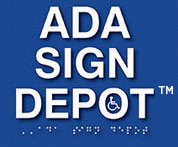Protect Your Property from ADA Lawsuits
ADA Sign Depot
March 08, 2014

Protect Your Property from ADA Lawsuits
Jim Porter is an attorney with Porter Simon licensed in California and Nevada, with offices in Truckee and Tahoe City, California, and Reno, Nevada.
Our North Tahoe community was recently targeted by a disabled individual who sued upwards of 45 mom and pop businesses for alleged violations of the Americans with Disabilities Act (ADA). Your business could be next.
If you read no further, heed this advice:
UPGRADE YOUR COMMERCIAL BUILDING TO BE FULLY ADA COMPLIANT. Be proactive.
ADA LAWS
In addition to federal ADA laws, California has the Unruh Civil Rights Act and the California Disabled Persons Act, the latter being California’s ADA law. A violation of the Unruh Act can result in a penalty of $4,000 per violation.
Disabled Individuals may sue if they visit a commercial property/public accommodation open to the public and encounter ADA violations making access difficult.
You may remember glowing reviews of these ADA laws in earlier Law Review columns.
DEVIL IN THE DETAILS
As with any law, the devil is in the details, and ADA laws have endless details, from heights of mirrors to types of door handles, slopes of parking areas, ramps and walkways, size, height, color and lettering of signs, height of toilet paper dispensers (and everything else), location and type of toilets, leg space under counters, door widths, parking standards … thousands of pages of detailed specifications.
The effective date of ADA laws varies, but there is no such thing as a “grandfather” exemption, even for buildings built before 1992 when the federal Act became effective. But for pre-1992 properties, there is an important exemption if a certain ADA fix is not “readily achievable.”
“Visits” to a particular premises must be in good faith with a sincere intent to purchase services or goods, not “litigation visits” made to enhance damages for an ADA lawsuit. I know this because our office is representing at least a dozen local businesses defending ADA suits.
CALIFORNIA ADA
In recent years, our Legislature has amended the California ADA laws allowing business owners to have their properties inspected by an ADA specialist who can prepare a Certified Access Specialist (CASp) report which identifies ADA shortcomings in the building and property.
The report can be a prophylactic of sorts against ADA lawsuits and gives business owners a reasonable timeframe to make required corrections, generally considered to be around three years. (Don’t wait that long to make corrections.)
Through Senate Bill 1188, the California Legislature appropriately attempted to curb abusive ADA lawsuits, but from my experience, some plaintiffs are able to circumvent the changes.
ADA PLAINTIFF
The wheelchair-bound litigant who has sued dozens and dozens of businesses in the North Lake Tahoe and Truckee area (in addition to thousands of others throughout Northern California) is Scott Johnson.
Mr. Johnson does multiple — what only can be described as — “drive-by” visits of properties, not even leaving his van.
He does this before he sues to increase his money claim. His attorneys demand approximately $25,000 to settle, in addition to mandating ADA upgrades.
I applaud that ADA upgrades are accomplished; but the demanded attorney’s fees and claimed “damages” are entirely excessive, especially if no advance notice of an ADA violation is given, instead a few “drive-bys,” then a lawsuit.
Federal ADA law should be changed to require advance notice of specific ADA deficiencies before a lawsuit may be filed so business owners have an opportunity to cure. And a “Rule of Reason” should be adopted.
The goal should be to make facilities accessible to all, not to pad the pockets of a select profiteering few.
READ THIS
The take-home point is clear: Upgrade your commercial property so it is fully compliant with ADA laws, and in particular, the parking lot and entry.
Ignorance of the law is no excuse. It is the right thing to do and will provide a measure of protection from disabled mercenary litigants.
Email me and I will send you basic ADA parking lot standards and a flyer I received about a March 19 meeting at the State Capitol on abusive lawsuits.
Jim Porter is an attorney with Porter Simon licensed in California and Nevada, with offices in Truckee and Tahoe City, California, and Reno, Nevada. Jim’s practice areas include: real estate, development, construction, business, HOAs, contracts, personal injury, mediation and other transactional matters. He may be reached at porter@portersimon.com or www.portersimon.com.
- Tags: ADA Law, The ADA and Your Business Subscribe to this blog's RSS feed.


